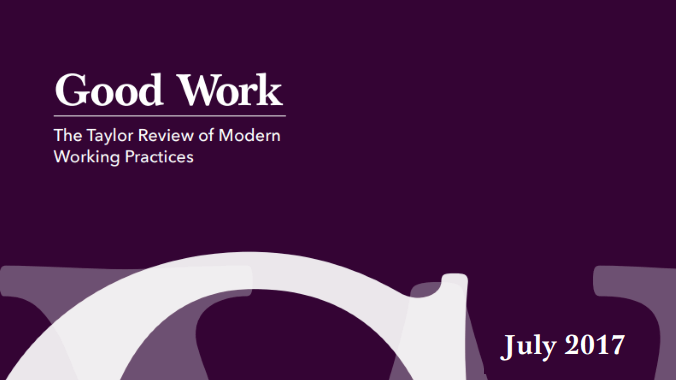IR35 could become obsolete if the recommendations from the Taylor Review of Modern Working Practices are enacted. But read between the lines and there is also a heightened risk of a wider rollout of the public sector IR35 reforms in the short-term.
Although it seeks ways to offer protections to victims of false self-employment, the Review’s recommendations and the potential fallout could also have major repercussions for the contract sector.
Key points for contractors:
- Aligning taxation law and employment status law could make IR35 obsolete
- Contractors taxed as employees could receive employment rights
- Recommendations could expedite potential reform of IR35 in the private sector
- Self-employment taxes look likely to rise as Review acknowledges tax shortfall
How the Taylor Review could impact IR35
The big news for contractors comes from the Taylor Review’s recommendation that taxation law and employment status law become more closely aligned. This proposal was made to help clarify the dividing line between ‘worker’ and self-employed status.
If you’re a contractor, this could eventually mean that your IR35 status could already be predetermined by decisions elsewhere. It could then also mean that if you are found to be inside IR35, you could expect to receive employment rights.
You’ve probably made a conscious decision to forego rights and benefits to work on your own terms, and 80% of the contractors we surveyed last year said they didn’t want rights. But if you’re subject to an inside-IR35 contract and employment taxes, why not compensate yourself with the accompanying rights?
If this recommendation is put in place, don’t expect to see many contractors caught by IR35 using limited companies. Instead they’ll be operating on fixed employment contracts to secure the rights they qualify for.
What does the future hold for contractors?
If you’re going to be taxed as an employee, you might as well accept the perks. This was the stance that many limited company contractors took when the public sector IR35 reforms hit, moving to employment-based models to claim workers’ rights. The only concern is that the Taylor Review could now hasten a wider rollout of these changes.
The Review acknowledges the disparity in terms of tax-take from employment and self-employment, and the Treasury estimates that the rise in self-employment is costing it £3bn a year. It’s one of the key reasons behind the emergence of false self-employment and unfortunately it’s inevitably going to result in an incremental tax increase for the self-employed, as indicated by the Review.
In the shorter term, don’t be surprised if the Government uses the arguments put forward in the Review to justify a private sector rollout of the IR35 changes. An announcement could even be made in the next Autumn Budget.
On top of addressing the tax yield and helping to protect vulnerable workers, a private sector rollout could help attract desperately needed talent back into the public sector, which has suffered since the reforms were implemented.
This is a move that could tick a lot of boxes for the Government – for contractors, it will mean getting your ducks in a row regarding your status before chaos ensues.

